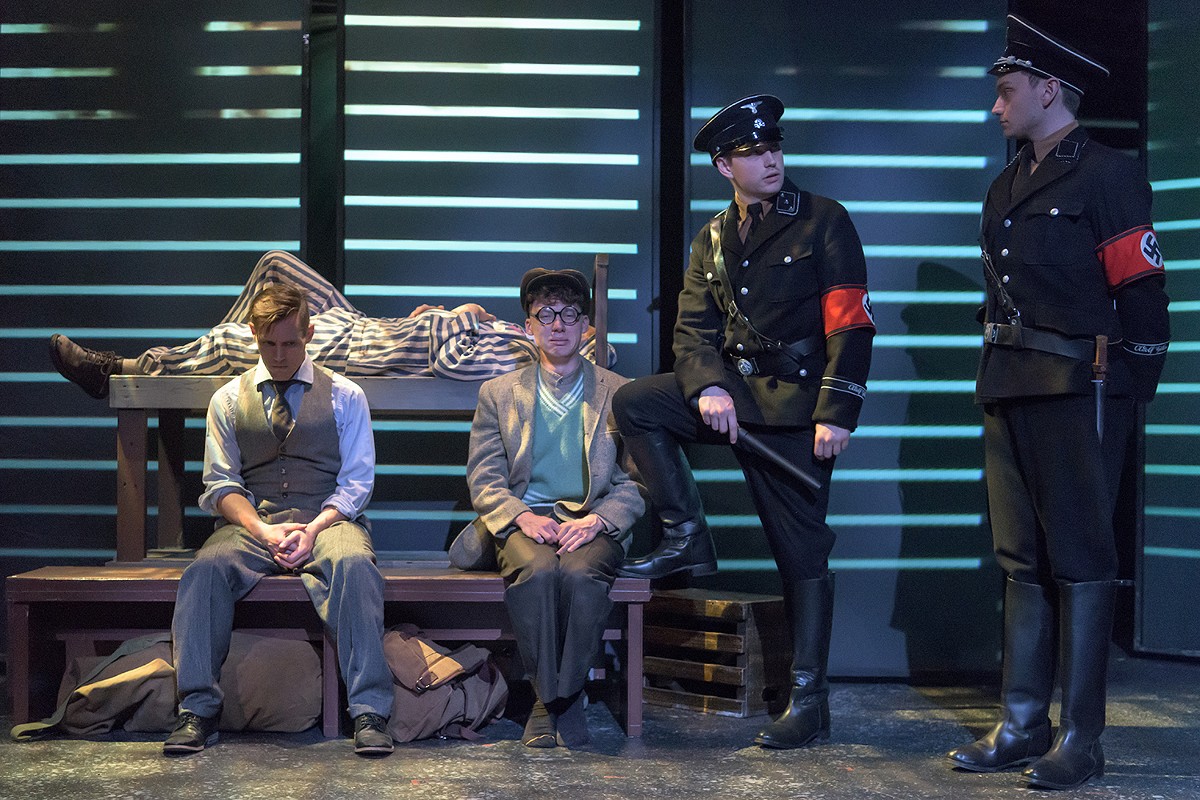In the shattering book, "This Way for the Gas, Ladies and Gentlemen," author and concentration camp victim Tadeusz Borowski relates a telling and ghastly moment. After a transport has pulled into Auschwitz with its cars filled with Jews and other "undesirables," a little girl on the platform is yelling out for her mother, who is hurrying away from her while declaring, "It's not mine! Not mine! No." The mother is young and healthy, she wants to live, and she believes she stands a better chance without her child at her side. It is almost the inverse of the devastating scene in Sophie's Choice.
Perhaps as horrific as the direct abuses by the Nazis are the indirect actions that fear of death triggered in normal people during the Holocaust. And that is brought forth with often compelling power in Bent by Martin Sherman, now at the Beck Center. This 40-year-old script tells the story of young gay men in Germany and throughout Europe (disparaged by the slang term "bent") who were sent off to the death camps.
With a couple small exceptions, this production under the direction of Matthew Wright hits exactly the right tone, sliding from a Noel Coward-ish amusing beginning to outright horror. And the effort is augmented tremendously by Aaron Benson's stark yet evocative set design, highlighted by the monochromatic projections designed by Steve Shack.
We meet Max and Rudy, two lovers who are negotiating morning-after hangovers triggered by a night of debauchery. It is 1934, the time when freewheeling and sexually liberated Berlin was slowly coming under the repressive hand of Hitler and his band of thugs. Indeed, this happens to be the very night when Hitler leads his attack on those within his own party. It is the Night of the Long Knives, when Ernst Rohm, the head of the storm troopers and a known homosexual, was killed along with many others of his cadre.
Max and Rudy are aware of the rumblings, but they don't take it all that seriously since Max feels he can outwit the authorities. That is, until their apartment is invaded by two SS men and the man Max and Rudy were partying with, Wolf (Nate Homolka), is captured and killed on the spot. Now the two young men, clad only in their skimpy robes, are on the run.
Along the way, they seek help from Greta, a heterosexual and happily married drag queen whose cynical view of life in Germany suddenly becomes very understandable. Desperate, Max demands money from Greta to fund their escape. After an interlude in the woods, where many have gone to hide, Max meets on the sly with Uncle Freddy, a closeted gay relative, who has a ticket to Amsterdam for him. But Max insists on two tickets, so he and Rudy can stay together.
And soon they are together, on a boxcar headed to Auschwitz. Max is asked by Nazi soldiers if he knows Rudy, whom they had been beating. Max declares he doesn't know Rudy and, when they demand that Max join in the assault of Rudy, Max's decision begins the slide toward his psychological destruction.
In the second act, we find Max in the work yard of the camp, wearing the yellow Jewish star instead of the pink triangle given to homosexuals, since he has been told gays were the most despised of all the prisoners. (This was a huge point of controversy, complete with pickets and street protests, when the play opened in 1979.) Max is pointlessly moving a pile of rocks from one place and back again, joined by Horst, a man who is wearing the pink triangle.
The consistently fine cast handles this material well, led by Geoff Knox as Max. Knox gets off to an uncertain start during the hangover scene, since he over-emphasizes the unpleasantness of the headache and nausea while not showing the dissipated pleasure of a man who can choose to indulge his obsessions, and his discomforts, as he pleases. But as the play progresses, Knox finds ways to make Max very real. As Rudy, Antonio DeJesus has all the attitude required, but some of his lines are lost due to high speed and low volume.
In the role of Greta, Brian Altman is spot on as this acerbic performer who freely admits to making money off "you people." It's just a shame Greta never returns, since Altman's presence is both amusing and chilling.
Act 2 is borderline exhausting, as it is meant to be, but it hangs together thanks to the volatile Knox and Andrew Gorell who nicely underplays Horst. Shuffling back and forth with their bricks and chunks of broken concrete, the men share their thoughts and, in the finest scene in the play, share a "sex act" while standing at attention during a break, without touching each other. Nothing else that comes after in this genre-breaking piece, even the tragic concluding event, can match the poignancy and sadness of that love scene.
Looking back, it is startling to realize how governments can brutally persecute certain groups of people. But now, as our own government rips families apart in the ongoing immigration fiasco, it's clear how easily it can happen.


